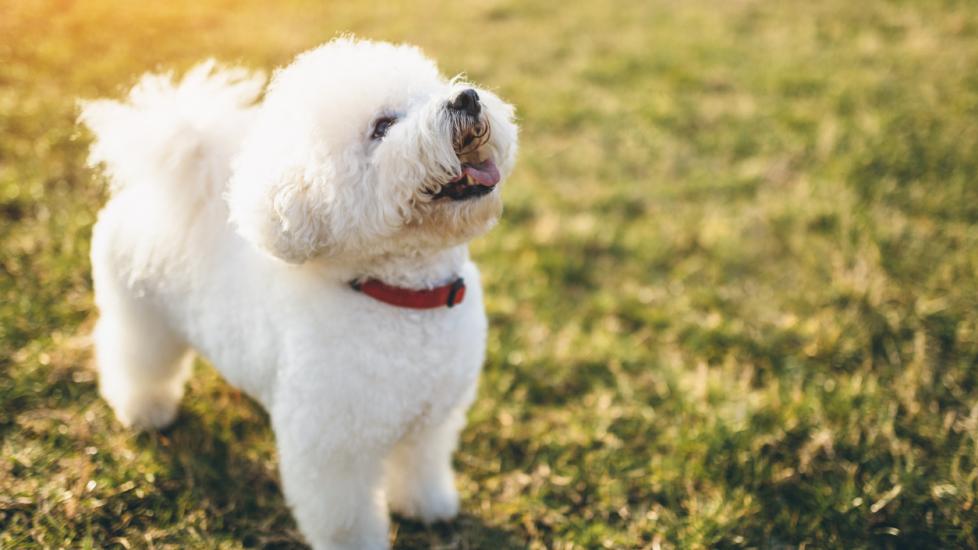Bichon Frise
iStock/MilanEXPO
The Bichon Frise (pronounced BEE-shon Free-ZAY) is a small dog breed that’s a playful and affectionate member of the non-sporting group. Good with children and friendly with other dogs, Bichons are curious and enjoy meeting new friends.
Despite their big personality, the Bichon Frise stands just under 1 foot tall and weighs an average of 12–18 pounds. Because they don’t shed as much as other dog breeds, they are considered to be a “hypoallergenic” dog breed, though all dogs—including Bichons Frise—contain allergens in their skin, saliva, and urine. That said, Bichons can be a good fit for some people with dog allergies.
Bichons Frise are Barbichon-type dogs, meaning they’re closely related to other dog breeds including the Bolognese, Havanese, and Maltese.
Caring for a Bichon Frise
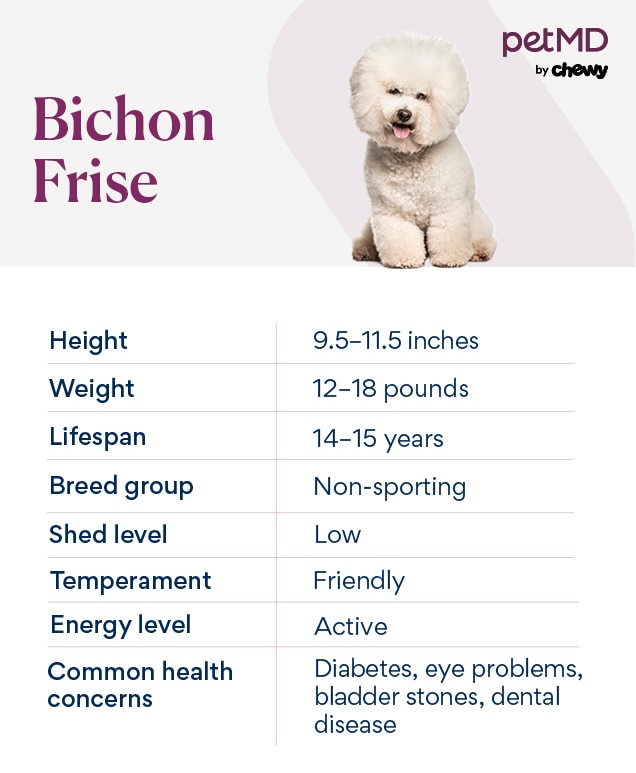
The Bichon Frise likes to play, be social, and play some more. Some of their favorite activities include playing with favorite toys and learning new tricks. Once their energy needs are met, Bichons are content to lounge with their family on the couch.
Due to their small stature, Bichons make good apartment dogs. They can really make excellent dogs for any home, including with first-time pet parents. While Bichons Frise tend to bark when alerted to foreign sounds, they are easily trainable because they’re so eager to please their humans.
Bichon Frise Health Issues
The average Bichon Frise lifespan is 14–15 years, but they can develop a few common health conditions during their long life.
Pet insurance may be a good investment for those interested in bringing home a Bichon Frise puppy.
Diabetes Mellitus
Diabetes in dogs is a disease of the pancreas that results in a failure to regulate blood sugar. This causes high blood sugar that requires daily insulin injections and a special diet prescribed by a veterinarian.
Common symptoms of diabetes include:
If you notice any of these symptoms in your Bichon Frise, take your dog to the vet for a physical examination, a comprehensive blood panel, and urinalysis. With proper management, dogs with diabetes can live long and happy lives.
Corneal Dystrophy
Corneal dystrophy is suspected to be an inherited condition in the Bichon Frise and can occur when your dog is just 2 years old. This disease is characterized by an opaque (light-blocking) area that develops in the center of the cornea (the outermost clear surface of the eye). This can affect the Bichon’s vision.
Corneal dystrophy doesn’t usually cause pain or require treatment unless it becomes advanced, resulting in an eye ulcer.
Bring your dog to your vet right away if you notice them squinting, scratching, or rubbing at their eyes. In cases of an eye ulcer, Bichons may be referred to an eye specialist for assessment.
Cataracts
Another eye problem Bichons Frise can develop are cataracts. This is likely hereditary and may begin developing when Bichon Frise puppies are as young as 6 months old.
Cataracts affect vision but can be treated with surgery. Talk to your vet if you notice any changes in your dog’s eyes or vision. Your vet may refer you and your dog to a veterinary eye specialist for further treatment.
Bladder Stones
Urolithiasis, commonly known as bladder stones, occurs when stones made of calcium oxalate, cystine, struvite, or calcium phosphate form in the bladder. This can be hereditary, secondary to urinary infections, or diet-related.
Symptoms of bladder stones may include bloody urine, urine with a strong odor, or straining to urinate. Bladder stones may be surgically removed or dissolved by a special diet prescribed by a veterinarian.
Dental Disease
As with all small dogs, the Bichon Frise is highly susceptible to dental disease. This is caused by plaque and tartar buildup and leads to bad breath, pain, tooth loss, and even organ damage in severe cases.
Prevention is the best weapon against dental disease. It’s recommended that Bichons get their teeth examined and cleaned by a vet at least once a year to reverse early dental disease and stay ahead of gum infection, tooth root exposure, and tooth loss. Brushing your dog’s teeth at home with a dog-friendly toothbrush and toothpaste will help, too.
What To Feed a Bichon Frise
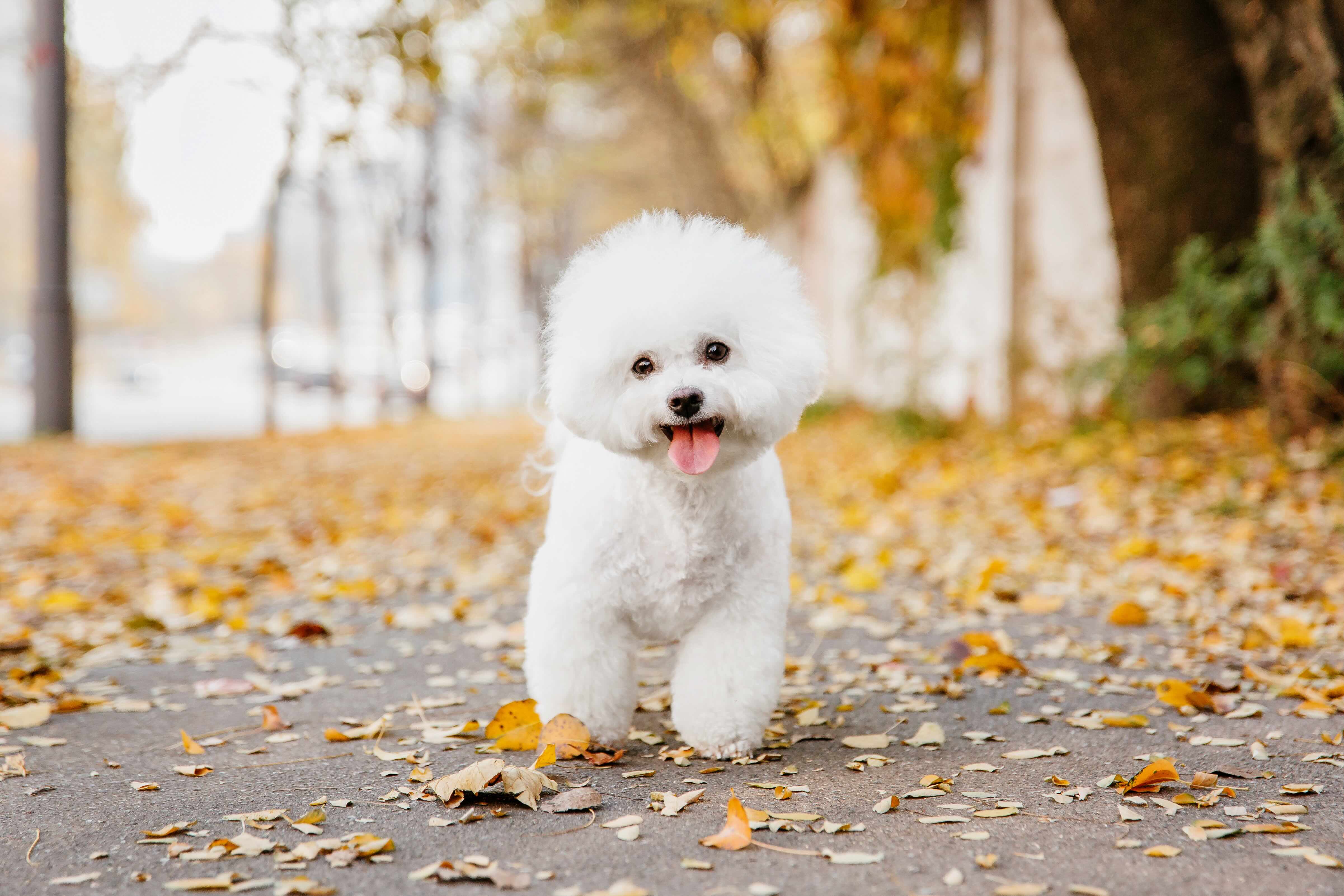
Bichon Frise dogs do well with a high-quality commercial diet that meets the Association of American Feed Control Officials (AAFCO) nutritional requirements. The food should be formulated for your dog’s life stage, meaning:
- Bichon Frise puppies get high-quality puppy food.
- Adults must transition to adult dog food.
- Seniors may benefit from senior dog food.
These dogs do best with a small breed food; you can also find breed-specific dog foods.
If your Bichon Frise develops bladder stones, your veterinarian will likely recommend a prescription diet to treat the stones or prevent them from returning.
How Much Should You Feed a Bichon Frise?
Closely follow the dog food manufacturer’s feeding recommendations on the packaging so you give your Bichon Frise the proper portions. Your vet can give you even better guidance on how much to feed your dog, based on your Bichon’s weight, body condition score, health, and lifestyle.
Take care not to overfeed your Bichon Frise, as obesity in dogs can cause and worsen other health conditions. Dog treats should make up no more than 10% of your dog’s daily calorie intake.
How To Feed a Bichon Frise
An adult Bichon Frise dog does well with at least two meals per day. Bichon Frise puppies may need to eat more frequently to reduce the chance of hypoglycemia (low blood sugar). Talk to your vet for guidance on the best feeding schedule for your dog.
The Bichon Frise enjoys playing games and solving puzzles. So instead of feeding them out of a regular dog bowl, you can hide their food in interactive food puzzles, lick mats, and snuffle mats.
Nutritional Tips for the Bichon Frise
Because the Bichon Frise dog breed can be predisposed to dental disease, feeding them a food designed to clean their teeth is beneficial. A diet or treats approved by the Veterinary Oral Health Council (VOHC) will help keep your Bichon’s teeth healthy between dental checkups and cleanings.
Dental chews can also be beneficial to decrease mouth bacteria, though they’re no replacement for regular tooth brushing.
Bichon Frise Training and Behavior Tips
Bichon Frise Personality and Temperament
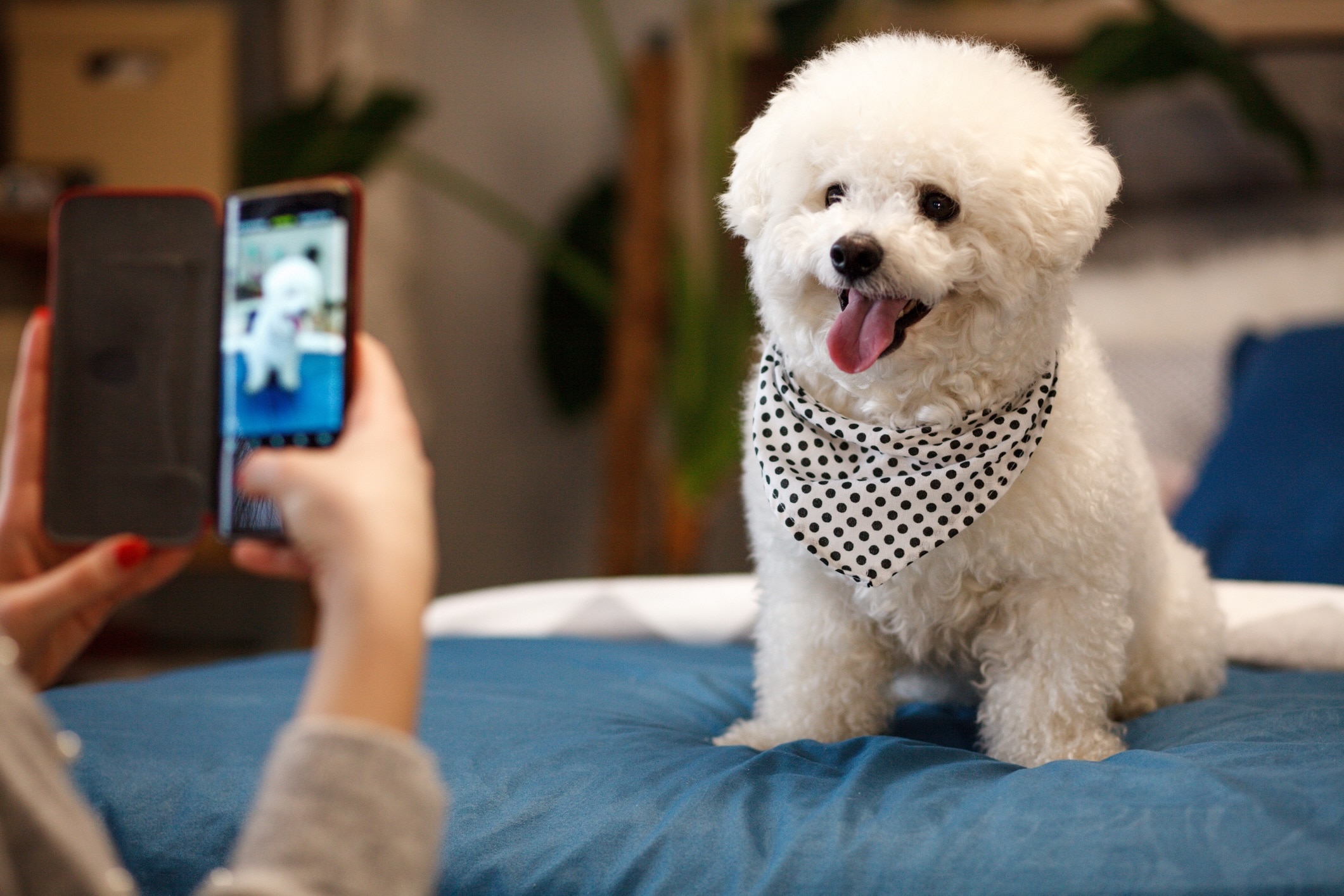
Bichons Frise are energetic dogs, but they’re also very adaptable to their surroundings. These traits are what make Bichons good with small children. And because they are very social with humans and other pets, Bichons fit right into most families and make ideal lap dogs.
With proper training and socialization from puppyhood, Bichons are friendly dogs that are comfortable meeting new people and animals.
Bichon Frise Behavior
Smart and social Bichons Frise warm up to new people and animals quickly. At home, Bichons are gentle, playful, and loving dogs.
They love to play and need lots of attention and affection to be happy. If they’re bored or lonely, Bichons may turn to undesirable behaviors like excessive barking or chewing in an effort to entertain themselves.
Schedule regular playtime with your dog, and make sure they have plenty of interactive toys to play with on their own, too.
Bichon Frise Training
The Bichon Frise is highly trainable, smart, and learns quickly. They are eager to please their humans and can learn a variety of tricks. Potty training and simple cues such as “sit” and “stay” are typically mastered quickly due to their intelligence.
Fun Activities for the Bichon Frise
-
Playing tug-of-war
-
Playing in the living room or backyard
-
Lounging in their human’s lap
Bichon Frise Grooming Guide
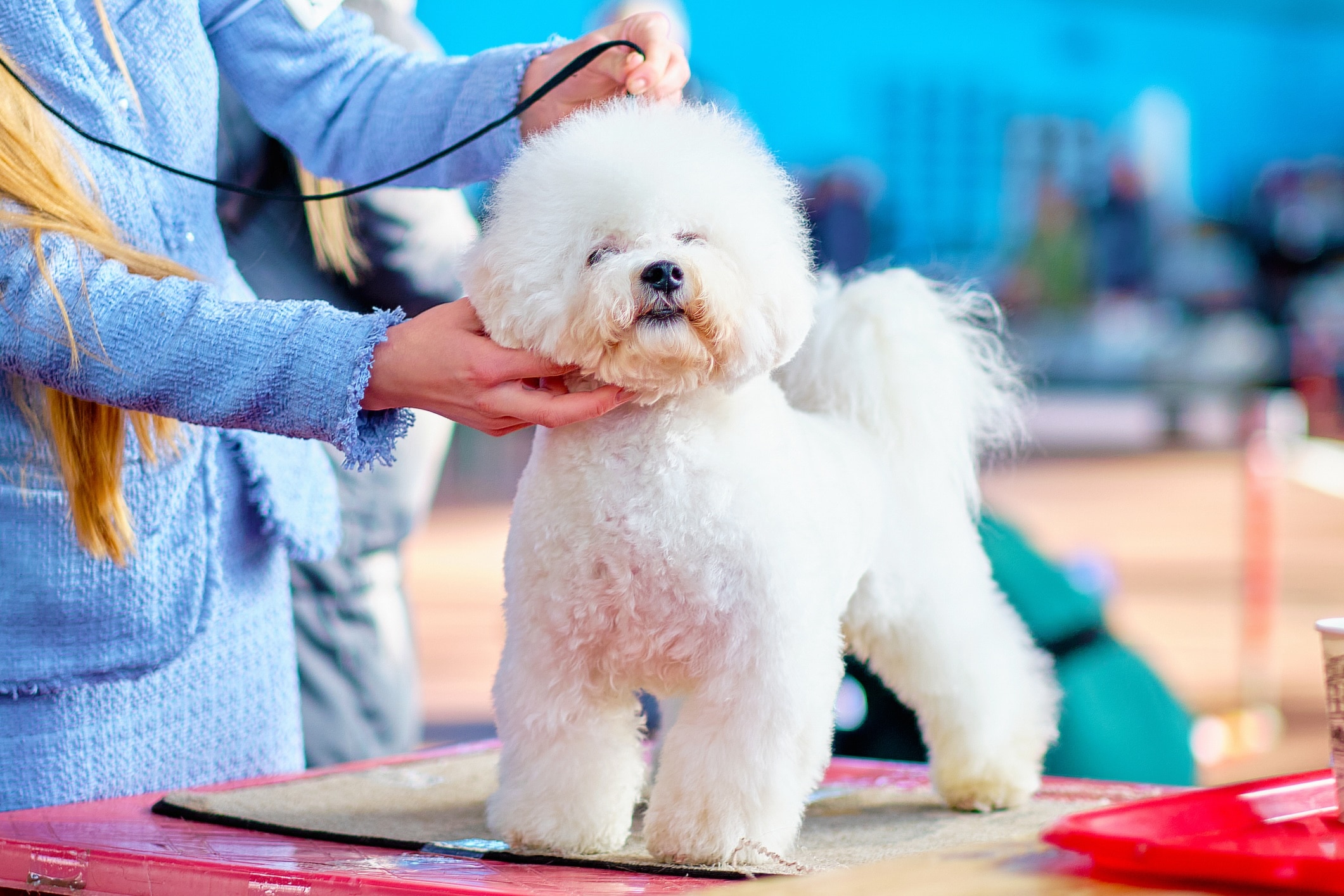
The Bichon Frise dog breed has a long double coat of curly white hair that requires a lot of upkeep.
They are minimal shedders and can be great pets for some people who experience dog allergies. But because there’s no such thing as a 100% hypoallergenic dog, spend time with the breed before bringing home a Bichon Frise puppy so you can see how your allergies react.
Skin Care
Bathe your Bichon at least monthly. A good-quality dog shampoo and conditioner will help your Bichon’s coat stay soft and white.
Ask your vet how often you should bathe your dog and the get recommendations on the best products to help keep your pup’s skin and fur healthy.
Coat Care
Brush your Bichon Frise’s white coat every day to prevent matting. They’ll also need monthly trips to a professional groomer to keep their fur neat and trimmed. Make sure to budget for regular grooming sessions.
Eye Care
Because Bichons are predisposed to eye conditions such as corneal dystrophy and cataracts, take your dog to the vet for a thorough physical exam every year. Discuss excessive tearing, squinting, or vision impairment with your veterinarian immediately.
These white dogs may also develop normal tear staining, which can be cleaned with dog-safe stain removers and eye wipes.
Ear Care
Clean a Bichon Frise’s ears once a month or as directed by your vet, using a vet-recommended ear cleanser.
Bichons often have excessive amounts of ear hair that can predispose them to ear infections. If your pup is scratching excessively at their ears or if their ears are smelly or painful, take your Bichon to your veterinarian for an examination.
Considerations for Pet Parents

The Bichon Frise dog breed is a great family pet and highly suitable for families with younger children. They will do well in apartments due to their small stature and can work out most of their energy with some living room playtime.
Although they may bark at strange noises, they are not considered to be excessive barkers as long as their needs are met. They are very social dogs, and strangers quickly become friends of the Bichon Frise.
But they are high-maintenance when it comes to grooming—Bichons require daily brushing and at least monthly baths to keep their hair from matting. Make sure you have the time to dedicate to at-home grooming and the budget for professional appointments before bringing home a Bichon Frise puppy.
Bichon Frise FAQs
Is a Bichon Frise a good family dog?
Yes, the Bichon Frise makes an excellent family dog. They are good with kids and other animals, and they’re very playful.
Are Bichons smart dogs?
Yes, the Bichon Frise is a smart dog and easy to train. They quickly pick up basic cues and can learn fancier tricks, too.
How much does a Bichon Frise cost?
Because Bichons are affectionate, well-behaved, and allergy-friendly dogs, they can be quite expensive. The typical Bichon Frise price is typically over $1,000, though prices vary depending on the breeder, bloodline, and where you live.
You might also find a Bichon Frise for adoption at breed-specific rescues.
How do you pronounce Bichon Frise?
The correct Bichon Frise pronunciation is “BEE-shon Free-ZAY.”
